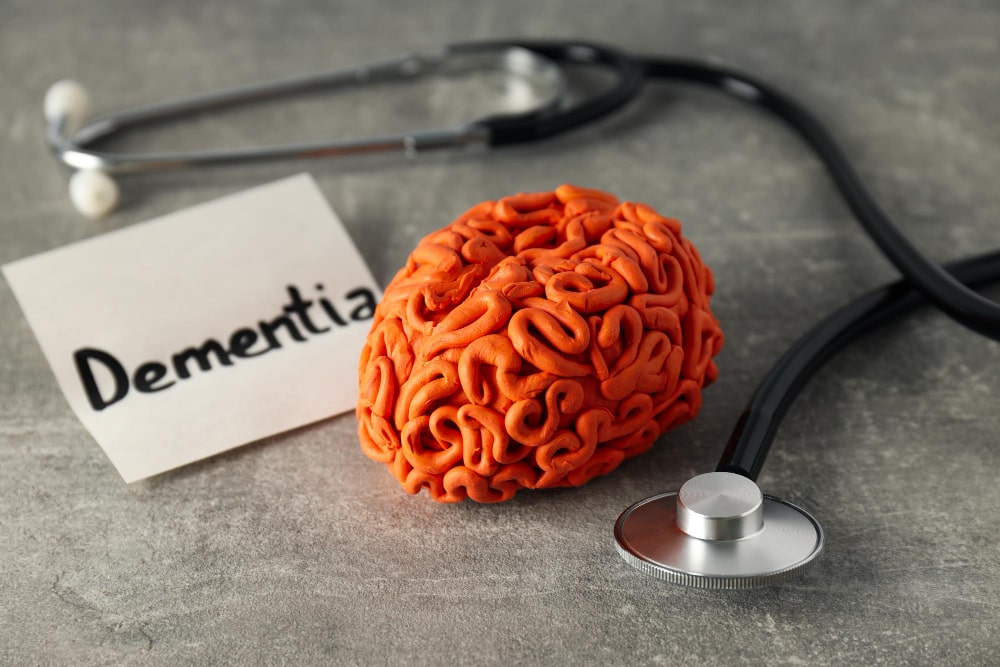The term Dementia does not refer to a specific disease but is used to describe a multitude of problems associated with a decline in proper brain function. A person suffering from Dementia suffers from a decline in cognitive abilities over time in a gradual manner. In other words, Dementia consists of a large number of neurological diseases of the progressive order. General symptoms of Dementia include the inability to think properly, issues in problem-solving, loss of language, and loss of memories among others. Cases of Dementia are usually detected in people of old age. The loss of brain function makes it hard for people to go on with their daily lives.
There are many types of Dementia known to affect millions of people all around the world. More than 200 types have been identified in patients suffering from this disorder. Out of all these types, Alzheimer’s disease is the most common. Most people suffering from Dementia are diagnosed with Alzheimer’s disease. Just like most of these types, Alzheimer’s disease begins with mild memory loss which then escalates with time. Eventually, the person loses their ability to talk and carry on a conversation with someone. People suffering from Alzheimer’s disease have been also known to lose the ability to respond to their surroundings. It is because Alzheimer’s disease affects parts of the brain that regulate language, memory, and thought.
Other common forms of Dementia include Lewy bodies Dementia, vascular Dementia, mixed Dementia, frontotemporal Dementia, etc. This article will focus on Lewy Body Dementia, its causes, symptoms, and its stages.
Table of Contents
- What is Lewy Body Dementia?
- Causes of Lewy Body Dementia
- Symptoms of Lewy Body Dementia
- 7 Stages of Lewy Body Dementia
- Conclusion
What is Lewy Body Dementia?
Lewy Body Dementia is a subtype of Dementia that occurs due to the deposition of a protein called Alpha-synuclein in various parts of the brain. This deposition takes place in the form of small bodies which are termed Lewy Bodies. These bodies have been known to cause various chemical changes in the brain. These changes are then responsible for interfering with the normal functioning of the brain and its parts. Most of the problems encountered deal with changes in mood, behavior, and failure of coordination leading to the loss of movement and thinking problems. Lewy Body Dementia is known to affect people in old age. Most of the patients are typically 50 years old or older. In rare instances, younger people can also suffer from Lewy Body Dementia. This disease has been diagnosed in people all over the world with millions of people being affected in the US alone.
Just like all other subtypes, Lewy Body Dementia starts slowly and gets severe over time, especially with advancing age. The disorder can persist from five to eight years from the time of diagnosis till death. The severity of the disease and the pace of the development of its symptoms vary from individual to individual. At first, the patient only suffers from minor problems and can take care of himself. With the passage of time, the person then requires assistance to carry out daily tasks. Most of the patients are dependent upon others in the terminal stages of the disorder.
Causes of Lewy Body Dementia
Despite its prevalence, scientists have yet to identify the exact cause of Lewy Body Dementia. Studies are being carried out to understand the genetics and the biology of the disorder to pinpoint the precise cause so it can be better treated in the future. Most studies have shown that the deposition of Lewy Bodies is highly associated with the depletion of certain nerve cells that play a huge role in brain functioning by releasing two important neurotransmitters. Neurotransmitters are chemicals that are used by the body to communicate between two neurons. The chemicals are released into the synaptic cleft in the form of vesicles which are then carried to the receiving end of the recipient cell. The two neurotransmitters we are talking about are acetylcholine and dopamine. Acetylcholine plays an important role in learning, the formation of memories, and the activation of muscles. On the other hand, dopamine is involved in regulating mood, sleep, motivation, movement, cognition, and behavior.
Symptoms of Lewy Body Dementia
Lewy Body Dementia can include both mental and physical symptoms. At first, these symptoms are unrecognizable but they eventually become more prominent with time and age. Some of these symptoms include:
- Loss of thinking abilities. Just like in the case of others subtypes, the thinking capability of the affected person gets worse with time. As the disorder progresses, memory problems also become commonplace. The more affected the brain becomes, the more a person struggles with making conversation, making the right judgment, and unawareness of the environment.
- The patient may suffer from sudden changes in wakefulness, alertness, and concentration. These could occur from time to time or the in case of severe Lewy Body Dementia may occur multiple times a day. These symptoms help distinguish Lewy Body Dementia from Alzheimer’s disease during diagnosis.
- Another symptom associated with Lewy Body Dementia is the occurrence of visual hallucinations. The affected person may see things that are not present in their actual environment. These symptoms are pretty common in people with Lewy Body Dementia. More than 80% of patients suffer from visual hallucinations. Other types of hallucinations (audio, smell) are far less common.
- Physical symptoms can include tremors. The patient’s body may start shaking even when they are inactive or at rest. Once again, this occurs due to damage and chemical changes in the brain parts.
- Loss of coordination. Parts of the brain like the cerebellum play an important role in the overall movement and coordination of body parts. This coordination is lost due to damage to brain parts. This issue is further worsened by the development of balance problems. The affected person may suffer from repeated falls while walking.
- The patients may suffer from muscle rigidity. The stiffness of the muscles makes it more difficult for the patient to move. As a result, the movement of the person is slowed down. The person is known to shuffle walk or walk with a frozen stance.
- The rigidity of muscles and loss of coordination may also result in swallowing problems while consuming meals.
7 Stages of Lewy Body Dementia
The following are the seven stages of Lewy Body Dementia along with their symptoms:
Stage 1: No cognitive decline
During this stage, the patient does not suffer from any loss of his/her cognitive abilities. It is hard to diagnose Lewy Body Dementia at this stage as it is very difficult to tell if something is wrong. The affected person appears normal to his family and friends. While a CT scan or an MRI scan at this stage can lead to the diagnosis of the disease, most people are diagnosed at later stages as symptoms become more apparent later on. An early diagnosis can’t cure the disease entirely but can help in reducing the pace of progression.
Stage 2: Very mild cognitive decline
At stage 2, the affected person starts showing some symptoms of a minor nature. The symptoms, however, are so subtle, it is hard to identify if something is really out of place. The symptoms at this stage include mild forgetfulness like forgetting certain names or finding trouble locating certain things. Similar to stage one, diagnosis at this stage is often difficult and most people go undiagnosed until later stages start to kick in.
Stage 3: Mild cognitive decline
It is at this stage that certain symptoms may manifest that is out of the ordinary for the person in question. If picked upon by family members or close ones, diagnosis at this stage is possible. The patient may find it difficult to concentrate on his daily tasks. Also, dementia begins to kick in resulting in forgetting the names of certain objects, places, or people.
Stage 4: Moderate cognitive decline
Most cases of Lewy Body Dementia are officially diagnosed at this stage. This stage is associated with symptoms that make it easier for medical experts to diagnose the culprit with certain tests or exams. Dementia progresses to the stage where it becomes difficult to carry out daily life activities like performing tasks or moving from one place to another. Other symptoms include tremors, aspiration, drooling, difficulty in swallowing, etc.
Stage 5: Moderately severe cognitive decline
The affected person suffers from advanced dementia which may lead to problems in completing daily tasks. Important details like phone numbers may become difficult to recall. At this stage, the patient now becomes dependent on close ones to perform certain tasks like bathing and preparation of meals. Other symptoms include a high fever and increased hallucinations.
Stage 6: Severe cognitive decline
Individuals at this stage are now highly dependent upon others for their survival. Patients are only able to remember certain memories and most of them are from their early lives. Some individuals may also lose the ability to talk. The affected person also undergoes a personality change that may last for 2 years.
Learn More: Memory Care For Your Loved One
Stage 7: Very severe cognitive decline
This is the final stage of Lewy Body Dementia. The patient loses all ability to talk or walk. It is necessary to look after the patient all around the clock to ensure their survival.
Conclusion
Lewy Body Dementia is a progressive neurological disorder that is identified by memory loss, difficulty in speaking, changes in personality, loss of movement and coordination, etc. The exact cause of this disorder is unknown. It is recommended that you get your loved ones diagnosed as early as possible so that they can enjoy improved life spans and better health.







